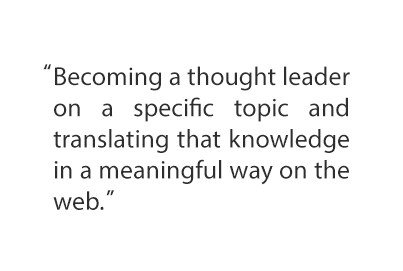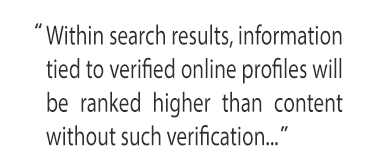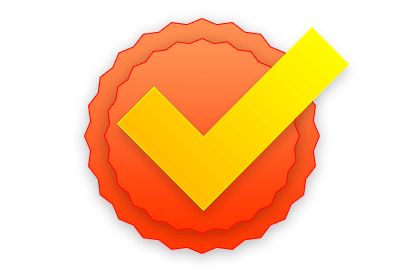25 Ways to Build Online Authority
Have you been building your authority online around the topics most relevant to your business?
We believe that online authority is more than just a new buzzword created around Google predictions so we want to help you establish yours.
In this article we are going to share 25 ways to build your online authority, outside of just writing content, to help you grow your brand and your business.

Why You Should Care About Online Authority
To really understand the importance of building your online authority it’s necessary to know what it actually is first.
Online authority is …

Establishing yourself as a credible, resourceful and legitimate source of information around something you specialize in comes with many advantages. Here are just some of them.
Advantages of Being an Online Authority
- Quickly gain [more] trust from your customers and prospects, which usually leads to more sales
- Establish respect amongst your peers, which could lead to beneficial partnerships and business opportunities
- Become an industry source, which can lead to traffic and links to your website / blog
- Allow you to get traction on new projects and ventures much faster, which can help to reduce startup marketing costs
- Attract more online and offline referrals
The [Possible] Future of Online Authority
Just by following Google’s new product launches / enhancements and executive interviews, it’s pretty clear that online authority will get the attention that many believe it deserves.
Here’s a quote from Eric Schmidt of Google…

Google Authorship is the biggest example of this as Google is trying very hard to get every piece of content tied to an author with each author being tied to Google+.
And although most have not found it to be directly correlated to rankings just yet it only makes sense that search results will eventually be influenced by the trust, credibility and authority that writers and content publishers are able to build up.
Why do we believe this?
It just makes sense as users want to connect with people not brands or anonymous voices. By associating a face and name with a piece of content a user is able to make a deeper connection and thus be more easily influenced by the things they consume on the web.
Building online authority not only helps to create stronger ties with users / readers, but it also pushes authors to produce better content as each piece will be tied to their name and online footprint.
Check out our tips below to build your online authority if you think it’s more than just a fad that’s being overhyped.

Is online authority the future or just another overhyped fad?
Whether you’re bullish on authorship and online authority or not, we would love to hear why. Let us know where you stand in the COMMENTS BELOW.
How to Build Your Authority Online
It’s hard to argue that authority will not be more of a factor in establishing rankings, attracting traffic and generating conversions.
So, if you’re not already a thought leader, then you have some work to do.
To give you a hand we have put together a list of 25 different ways – outside of just copywriting – to establish your online authority.
25 Ways to Become a Thought Leader Online
Even though there’s actually no such thing as “Author Rank” (yet), we do believe it is something we’ll see in the near future.
To take that a step further we think the following elements have a strong possibility of being used to determine someone’s online authority:
- Content (quality, type, amount, velocity, age, location)
- Links (quality, type, amount, velocity, age, location)
- Social (number of shares, types of shares, amount of activity, mentions, follower base)
- Recognition (citations, endorsements, testimonials, awards, mentions, associations, press)
- Offline (network, speaking engagements, sponsorships)
This is all obviously just speculation at this point, but when you break these elements down they make sense as possible contributing factors to determining online authority.
Assuming that these factors can and will be used for “Author Rank” let’s take a look at some creative ways to build online authority with them in mind…
Content
If you’re not producing content online, then you’re going to have a hard time establishing yourself as an online authority so we’re going to kick off our list with some creative ways to use content.
- Start a niche focused blog
- Create evergreen content or case studies that focus on very specific topics related to your expertise
- Optimize, update, repurpose and republish old website and blog content
- Get on a content development / publishing schedule to consistently push out quality content
- Curate content from other sources and build authoritative lists / resources
Links
We don’t see Google removing the importance of links from their algorithm anytime soon, not even if and when they decide to introduce Author Rank, so don’t forget to try out some of these ways to use links to build your authority.
- Use content marketing to promote new content to attract links from other websites and blogs
- Provide guest posts to websites and blogs that are relevant to your niche
- Establish relationships with editors and journalists to earn opportunities for editorial links
- Provide meaningful, helpful or engaging comments on blogs to add value to those conversations
- Create an embeddable badge that people can use to promote themselves after earning it through qualification (e.g. minimum score on a test you create)
Social
It’s pretty difficult to become a thought leader without being vocal about your expertise and without having a strong social following behind you to support and spread your knowledge. Leverage social media to build your authority with these methods.
- Establish a social following that is made up of a receptive, engaged audience…not one you purchase just for high number counts
- Stay consistent on your social media updates by sticking to a schedule
- Take advantage of paid advertising to further extend the reach of your social posts
- Use social follow and action buttons correctly, and throughout your messaging, to attract new followers
- Engage and build relationships with other thought leaders and influencers on social media
Recognition
One of the quickest ways to build authority is by garnering recognition from the right sources, for the right things. Leveraging this recognition can be a fantastic way to cement your online authority too. Here are some creative ways to do just this.
- Earn positive reviews and testimonials from past and current customers on Yelp, Foursquare, Google+ Places, etc.
- Collect endorsements from clients, associates and partners on LinkedIn, Angie’s List and Stik
- Promote certifications, designations and degrees on your website and bio pages
- Compete in online contests by submitting completed work for a chance to win awards
- Become an industry source for quotes and soundbites that editors need for their articles and editorials
Offline
Building authority is not limited to just online strategies. There are things you can do “offline” that can grow your online authority for the future by building relationships and getting links and social shares from those relationships:
- Participate in speaking engagements
- Host meetups centered around topics you specialize in and invite other speakers to contribute
- Throw a party or cocktail hour (before or after conferences are great opportunities for this)
- Be a sponsor for someone else’s conference, party or meetup
- Run a contest or charity event
These 25 tips will not make you an online authority overnight, but they will most certainly get you on the right path to establishing yourself as a thought leader in your space.
So, unless you’ve already created an unbelievable product that disrupts an industry and has garnered its own press, then you should be focusing on becoming the best at what you do and communicating that knowledge with your audience to establish your authority.

How are you building your authority online?
Chances are you’ve already done some of these things, but we’d love to know what we may have missed. Let us know in the COMMENTS BELOW.
It’s Really All About Trust
Authorship, Author Rank, Online Authority, Thought Leadership – no matter we call it we’re really just talking about building trust.

Establishing yourself as an authority ultimately means that you’re creating a increased sense of trust from others for yourself. And once you’re able to gain this trust from your customers, colleagues, competitors and prospects it becomes much easier to grow your business.
We gave you 25 different ways to build your authority to gain more trust so you’ve got plenty to keep you busy for a bit.
While you’re doing those things though try to keep the following in mind as they will keep you on track and help you build your authority much faster:
- Create and communicate with passion. This will show that you’re being genuine and not self-serving.
- Focus on specializing in one primary thing before expanding into other areas.
- Build relationships
Follow these 3 tips, along with the 25 specific things you can start doing today, and you’ll be well on your way to becoming an authority in your space.
And if you get stuck anywhere, lose focus or just stop believing in the benefits of becoming an authority, then let us know. We would love to help you build your authority, whether that involves helping you with content marketing and just spending some time on the phone with you to get you back on track.
Ready to start building your online authority?

10 Comments
Reputation Managers
August 20, 2013
Do you feel that Google’s latest update to their webmaster guidelines (link scheme) will affect the importance of linking expressed in your post? Great post by the way, very informative!
Vinny La Barbera
August 20, 2013
As with anything, as long as they are done in moderation and not for the sole purpose of “link building”, then Google should not have a problem with them.
The second people start to abuse these channels (e.g. Press Releases) Google will scrutinize them more and adjust their algorithm to prevent widespread abuse.
igl00
October 28, 2013
really good tips!
Spook SEO
December 5, 2013
Here are a lot of advantages of becoming an online authority and most important is that, it gives benefit to businesses and thus they can get success like a brand. SEO support can also be achieved in the form of getting backlinks and great traffic.
Raleigh Leslie
January 14, 2014
Vinny – Great post you really took the time to address everything. Love the definition you provided in the image for Online Authority: Becoming a thought leader on a specific topic and translating that knowledge in a meaningful way on the web. Well defined.
I wrote a blog post on one specific aspect of building online authority which is blog commenting. Blog commenting has a reputation for being a ‘spammy linkbuilding tactic’ and I really think we need to change the way we think about blog commenting. It’s not linkbuilding it’s authority building to position yourself as a thought leader and subject matter expert. In which case the benefit is not backlinks or traffic but rather positioning and exposure. You can read the full post here:
http://pageladder.com/blog-commenting-link-building-instead-authority-building/
Vinny La Barbera
January 14, 2014
Thanks for the feedback Raleigh.
I agree that blog commenting has gotten a bad rap and it needs to be thought of differently – when it is used with the right intentions at the forefront.
The problem is, like with most other forms of online marketing (e.g. directory submissions), that people have abused it for the sole purpose of spamming or trying to manipulate search rankings.
To me blog commenting is relationship building more than anything else. If I take the time to read an article and leave my thoughts or feedback, then that usually means that I cared enough and respected that person’s work. Blog commenting is most effective (in my experience) when people do it because they actually care about the content they read and felt moved to leave their input.
James Lenfers
October 17, 2015
That is why I don’t mind people commenting on my blog even when I know it is back linking and long as they read it, or in the case of my 5,000 word post they would need to pack a lunch, scan it to make a intelligent comment. But I also don’t use Disqus, I use a fully login able comment section, so they can back link that website while they comment.
I can see your point that author authority probably will eventually come in the equation. But even this is questionable as to what it is really worth. Because in most cases with bloggers, it really isn’t an issue of authority or trust. It is a issue of popularity, because popularity level is the major symbol of what gets looked at as relevant.
Quite frequently that is simply regurgitated information. The same thing being said over and over again, in a different way by a different person, and the one that does it consistently and in a way that becomes popular eventually gets seen as the most relevant and trustworthy. That does not actually make them so, just popular which comes a major extent from telling people what they want to hear, or in the way they want to hear it. In effect, being entertaining.
Tracy-Anne Reid
January 5, 2018
I know this comment was from ages ago, lol… but…. I think you’re so right. I know people that truly know their stuff, and yet they are no where. Why? Not because they aren’t an authority on the matter, but because they haven’t signed up to the idea that it is ultimately a popularity contest. You basically need to become a “Celebrity” in your industry.
I find it interesting because a lot of the “top” people in my industry – don’t know a lot more than me. I sign up for their courses, and learn stuff I already know. There’s always something new to learn – but it makes me beg the question – why am I not doing it and getting the income they are? Clearly, I know as much as them, but I haven’t monetised it – or been POPULAR enough in that niche.
But then I know people who are popular, who don’t actually have it turn into actual revenue. So I think it’s definitely a balance of celebrity, actually knowing your stuff, AND having the business nous to convert your followers to customers.
Tracy-Anne Reid
January 5, 2018
Hi Vinny! Thanks so much for putting together such a great post. It’s funny how often I read posts, and yet never leave comments. I think I should take the time to do that from now on, rather than just “lurking”. lol. Really appreciated all your idea’s and insights, and I have added them to my visibility and authority list I’m pulling together for myself. Will keep your link in case I end up creating a post out of it! :)
Vinny La Barbera
January 5, 2018
Comments like yours make it worth it the time and effort to put these together. Definitely keep me posted on your list when you publish it.